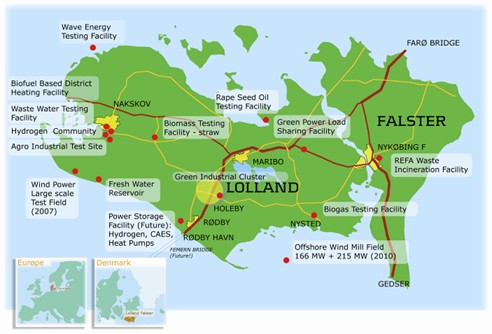Lolland is a rural island in the south of Denmark and is part of Region Zealand. It has a population of approximately 43,000 inhabitants. The municipality was renowned for its strong agricultural industry, including sugar beet production, as well as its shipbuilding industry. The region experienced deindustrialisation and the economic downturn in the 1990s, which triggered the transformation of the local economy. From the beginning of the 2000s, industries in the fields of renewable energy and agro-industry started to emerge, leading the region out of recession through the creation of jobs and business opportunities.
A world leader in bioeconomy development
Lolland is among the world’s leading examples of ‘green regions’, capitalising on agriculture and livestock production and the existing network and experience developed through the Lolland Community Testing Facilities (CTF). Local politicians saw early on the potential of a bioeconomy for the economic development and job creation that triggered the first investments and support activities. Lolland has several small and large-scale biogas production projects, biofuel production including rapeseed oil and bioethanol from agricultural residues, and R&D projects in the field of algae biomass. The current focus in the region is on accelerating the production of second-generation biofuels from agricultural waste.
Innovative collaborations for bioeconomy development
The establishment of an environment for green innovation in Lolland has been supported by a number of initiatives and projects in a quadruple helix set-up. Among the enabling factors has been the presence of R&D centres and extensive experience in the field of energy and industrial ecology (for instance, see Case 3 on the Industrial Symbiosis initiative in Kalundborg). The establishment of the Lolland CTF in 2007 paved the way for the large-scale initiatives promoting green growth in the region. CTF provide the opportunity for industries to test and demonstrate innovative projects and renewable energy technology on a full scale. The mission of CTF has also been to strengthen the synergies and co-operation between different stakeholders, including the local governments, research centres and local businesses. Partly due to the presence of an institution such as CTF, Lolland has been able to attract innovative installations and businesses to the region and strengthen the R&D activities in the field of renewables. CTF is financially supported by both the local and central government, and the revenues from the installations are fed into public support for renewable energy. Lolland also hosts the Green Center and the Algae Innovation Center, which foster innovation within the food and agro-industry.
Cooperation a key ingredient of success
Lolland’s success in realising a bioeconomy can be attributed to close co-operation between the different stakeholders, including the community, and the evolvement of innovative co-operation structures. The latter has been facilitated by meetings and networking, cluster development, innovation platforms and industrial synergies. Several instruments have been developed in the region to support the collaboration, develop ideas and realise new bioeconomy projects, such as the Regional Sparring Group on the Bioeconomy and the Green Committee. Among other enabling factors has been the strong political support from the regional government, and visionary planning from local and national government, as well as access to funding for R&D, preparatory activities (e.g. establishing bioenergy plants), training of SMEs, project development and other support activities.
Regional dimension
The development of the bioeconomy in Lolland not only provides practical and innovative solutions for local and regional problems, but also represents a significant export potential and international recognition for the region. An increased focus on green growth has catalysed the development of bio-based businesses in Lolland and attracted new firms and funding to the region through CTF activities.

Learn more…